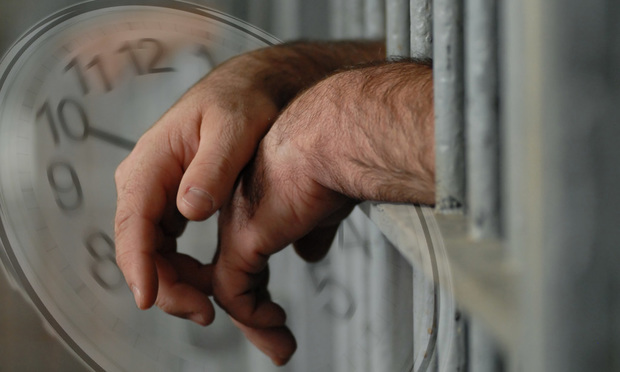Third Circuit Holds 18 Months in Jail the Maximum Penalty for Civil Contempt
A split three-judge panel of the U.S. Court of Appeals for the Third Circuit ordered the release of Francis Rawls, who is under prosecution for possession of child pornography and was held in contempt for refusing to give investigators his computer password.
February 10, 2020 at 01:42 PM
3 minute read
 Photo: Bigstock
Photo: Bigstock
In the case of a man who has spent four years in prison for civil contempt, a federal appeals court has ruled that the maximum penalty for that violation is 18 months.
A split three-judge panel of the U.S. Court of Appeals for the Third Circuit ordered the release of Francis Rawls, who is under prosecution for possession of child pornography and was held in contempt for refusing to give investigators his computer password.
Rawls' case centered on whether he is considered a "witness" under 28 U.S.C. Section 1826, which states: "A witness in any proceeding before or ancillary to any court or grand jury of the United States refuses without just cause shown to comply with an order of the court to testify or provide other information, including any book, paper, document, record, recording or other material, the court, upon such refusal, or when such refusal is duly brought to its attention, may summarily order his confinement at a suitable place until such time as the witness is willing to give such testimony or provide such information … but in no event shall such confinement exceed 18 months."
Judge Julio Fuentes wrote in the court's Feb. 6 majority opinion that Rawls is a witness under the law.
"Rawls is a witness within the meaning of Section 1826(a) both because he is being asked to provide testimonial information and because the statute reaches even nontestimonial acts of production," Fuentes said.
Judge Theodore McKee filed a concurring opinion.
"I join Judge Fuentes' opinion in its entirety. For reasons he explains, I completely agree that a criminal defendant cannot be deprived of statutory and constitutional protections afforded those accused of crimes merely because s/he also happens to be a material witness," McKee said. "Limitations placed upon the government's ability to incarcerate a criminal suspect do not disappear into the ethers merely because that same person is also subject to confinement as a material witness. However, I write separately because I do not think that the government's conduct in prosecuting Rawls should escape additional comment."
He continued, "There may well be some justification for insisting that Rawls be imprisoned on contempt charges before his all but certain prosecution for child pornography and the very severe sentences he would be exposed to if convicted for the latter offenses, but such justification for the government's conduct here certainly escapes me."
Judge Jane Roth, however, disagreed with the majority's reasoning.
"Because I do not agree with the reasoning of the majority or of the concurrence, I respectfully dissent," Roth said. "My dissent is based on my belief that 28 U.S.C. Section 1826(a) should be held to cover the situations expressly stated therein: 'any proceeding before or ancillary to any court or grand jury of the United States.' In this case there is no such proceeding—at least, not so far. For that reason, I believe that we should not stretch a statute to cover a situation that is not included in the language of the statute."
Rawls' federal public defender is Keith Donoghue, who did not respond to a request for comment.
The U.S. Attorney's Office for the Eastern District of Pennsylvania declined a request for comment.
This content has been archived. It is available through our partners, LexisNexis® and Bloomberg Law.
To view this content, please continue to their sites.
Not a Lexis Subscriber?
Subscribe Now
Not a Bloomberg Law Subscriber?
Subscribe Now
NOT FOR REPRINT
© 2025 ALM Global, LLC, All Rights Reserved. Request academic re-use from www.copyright.com. All other uses, submit a request to [email protected]. For more information visit Asset & Logo Licensing.
You Might Like
View All
People in the News—Feb. 3, 2025—Antheil Maslow, Kang Haggerty, Saxton & Stump
3 minute read

Pennsylvania Law Schools Are Seeing Double-Digit Boosts in 2025 Applications
5 minute readTrending Stories
- 1Harrisburg Jury Hands Up $1.5M Verdict to Teen Struck by Driver
- 2Former Director's Retaliation Suit Cleared to Move Forward Against Hospice Provider
- 3New York Judge Steps Down After Conviction for Intoxicated Driving
- 4Keys to Maximizing Efficiency (and Vibes) When Navigating International Trade Compliance Crosschecks
- 5Houston Law Firm Files $250K Breach of Contract Suit Against 2 Former Lawyers
Who Got The Work
J. Brugh Lower of Gibbons has entered an appearance for industrial equipment supplier Devco Corporation in a pending trademark infringement lawsuit. The suit, accusing the defendant of selling knock-off Graco products, was filed Dec. 18 in New Jersey District Court by Rivkin Radler on behalf of Graco Inc. and Graco Minnesota. The case, assigned to U.S. District Judge Zahid N. Quraishi, is 3:24-cv-11294, Graco Inc. et al v. Devco Corporation.
Who Got The Work
Rebecca Maller-Stein and Kent A. Yalowitz of Arnold & Porter Kaye Scholer have entered their appearances for Hanaco Venture Capital and its executives, Lior Prosor and David Frankel, in a pending securities lawsuit. The action, filed on Dec. 24 in New York Southern District Court by Zell, Aron & Co. on behalf of Goldeneye Advisors, accuses the defendants of negligently and fraudulently managing the plaintiff's $1 million investment. The case, assigned to U.S. District Judge Vernon S. Broderick, is 1:24-cv-09918, Goldeneye Advisors, LLC v. Hanaco Venture Capital, Ltd. et al.
Who Got The Work
Attorneys from A&O Shearman has stepped in as defense counsel for Toronto-Dominion Bank and other defendants in a pending securities class action. The suit, filed Dec. 11 in New York Southern District Court by Bleichmar Fonti & Auld, accuses the defendants of concealing the bank's 'pervasive' deficiencies in regards to its compliance with the Bank Secrecy Act and the quality of its anti-money laundering controls. The case, assigned to U.S. District Judge Arun Subramanian, is 1:24-cv-09445, Gonzalez v. The Toronto-Dominion Bank et al.
Who Got The Work
Crown Castle International, a Pennsylvania company providing shared communications infrastructure, has turned to Luke D. Wolf of Gordon Rees Scully Mansukhani to fend off a pending breach-of-contract lawsuit. The court action, filed Nov. 25 in Michigan Eastern District Court by Hooper Hathaway PC on behalf of The Town Residences LLC, accuses Crown Castle of failing to transfer approximately $30,000 in utility payments from T-Mobile in breach of a roof-top lease and assignment agreement. The case, assigned to U.S. District Judge Susan K. Declercq, is 2:24-cv-13131, The Town Residences LLC v. T-Mobile US, Inc. et al.
Who Got The Work
Wilfred P. Coronato and Daniel M. Schwartz of McCarter & English have stepped in as defense counsel to Electrolux Home Products Inc. in a pending product liability lawsuit. The court action, filed Nov. 26 in New York Eastern District Court by Poulos Lopiccolo PC and Nagel Rice LLP on behalf of David Stern, alleges that the defendant's refrigerators’ drawers and shelving repeatedly break and fall apart within months after purchase. The case, assigned to U.S. District Judge Joan M. Azrack, is 2:24-cv-08204, Stern v. Electrolux Home Products, Inc.
Featured Firms
Law Offices of Gary Martin Hays & Associates, P.C.
(470) 294-1674
Law Offices of Mark E. Salomone
(857) 444-6468
Smith & Hassler
(713) 739-1250






